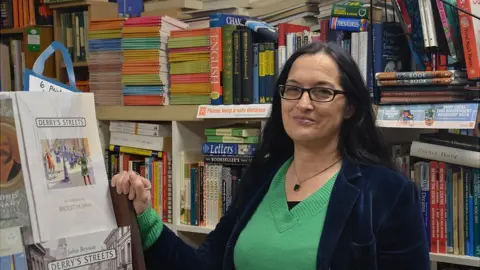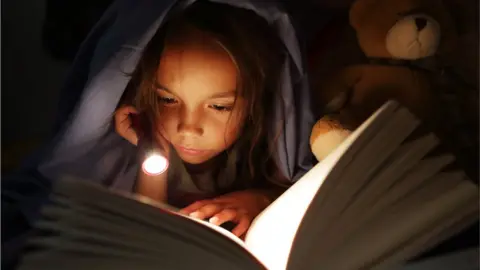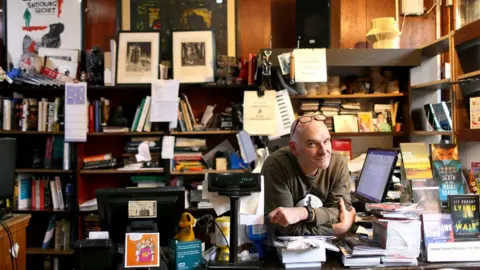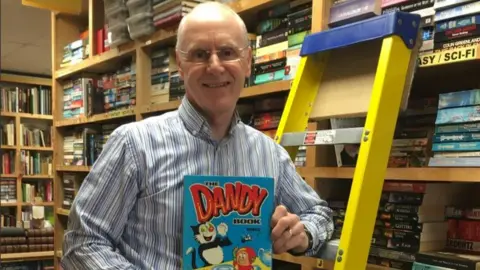Bookshops: A new chapter for independent sellers?
 BBC
BBCWhen bookseller Jenni Doherty reflects on how she managed to navigate the various coronavirus lockdowns, she quips: "We were all making it up as we went along."
That's probably how most business owners have felt.
But there's one thing the owner of Little Acorns Bookstore in Londonderry has been struck by over the past two years, and that's the support shown within the community for shopping local.
"Every community has become very much aware of what is actually on their doorstep - locally-owned businesses," she says.
In fact, she posted a photo on her shop's social media page before Christmas of a box of chocolates that a member of the public had left in the premises, anonymously, bearing the message: "A little token of thanks to a local business."
Even her bestsellers have been mostly those by local authors.
As local businesses go, independent booksellers are a long-beleaguered bunch.
Sales 'steadily on the increase'
They've weathered the ascension of the e-book and fought the rise of Amazon, with its model of cut-price, speedy deliveries.
Many do internet sales as well as attending to the traditional walk-in customers.
But despite the "massive downturn" of the first Covid lockdown in particular, they argue the personal touch they've been able to offer have helped them weather the turmoil of the last two years.
"A lot of customers have been contacting Little Acorns directly, and that type of customer contact has kept a lot of us [booksellers] going," says Ms Doherty.
She was due to move into new premises in February 2020, then lockdown hit and that opening was delayed until the following August.
"I don't drive, but [during the lockdowns] I was doing hand delivery on foot from a distance, or on the bus shelter outside," she says.
"I would go outside, all coated and masked up, and I wouldn't know what the customer looked like. I'd ask a person if they were there for a book, and they'd look at me and say: 'No, I'm here for a bus'.
"Local authors met on street corners to sign books. My brother delivered parcels, via bread van, to local petrol stations across the border for those unable to travel beyond the 5km radius."
Despite the pandemic, Ms Doherty says her sales have been "steadily on the increase" even if it has been "touch and go at times" - doubling from 2020 to 2021.
Christmas has been her "busiest time in 10 years of trading", both in terms of sales and footfall.
'Resilience and creativity'
More widely, UK consumer book sales climbed 7% to £2.1bn in 2020, according to industry body the Publishers' Association.
Some 202 million paperbacks and hardbacks were sold that year - the first time sales had passed the 200 million mark since 2012, according to separate figures.
Data for 2021 has yet to be released.
 Getty/Peter Cade
Getty/Peter CadeTrade representative body the Booksellers' Association, which has 22 independent shop members in Northern Ireland, says booksellers are embedded in their community, and that has served them well.
"The story you get, especially during the last 22 months, is one of resilience and creativity," says Alan Staton, director of strategy and communications.
"What we have seen is that sense of connectedness has become even stronger.
"One of the comments that I get from bookshops in Northern Ireland is the intergenerational nature of their customers - grandparents, parents and kids have all shopped in the same store. So there is a lot to be said for locality."
Like Little Acorns in Derry, that idea of being embedded in the community has been a central theme of the business model of Belfast bookshop No Alibis, which marks its 25th year in business in 2022.
Pre-pandemic, the shop hosted community gatherings, including poetry readings, music events and book launches.
Cementing community connections
Owner Dave Torrans also dropped off deliveries personally around Belfast during the various lockdowns, or posted out orders.
"You just have to navigate and offer something that others haven't done," he says, pointing to the shop's popular Staff Picks section which he says customers tend to gravitate towards.
That focus, like Ms Doherty's, has paid off.
No Alibi's sales in 2020 were up slightly on 2019, by about 2%. Sales in 2021 were up on the 2019 figure by a fifth, and the Christmas period was "fantastic".
"Businesses like ours, coming into the future, are going to have to cement that community aspect of what they do, reaching out to the local community, providing services that go beyond the click it and get it service, or it's going to be very hard," Mr Torrans adds.
"What Amazon does, it does efficiently and well, and with a really large hatchet."
There's still a degree of uncertainty looking to the future, he says, beyond the pandemic, pointing to the fact that Amazon Prime delivery vans have become a common sight on Belfast's roads.
 Pacemaker/STEPHEN DAVISON
Pacemaker/STEPHEN DAVISONHe also points to the issue that many small businesses grapple with - costs - be they energy, rental, or business rates.
"You can always attempt to negotiate with your landlord, but when it comes to business rates, that doesn't happen, and it's very difficult," he says.
No Alibis sells new books only, and Little Acorns has a 70%-30% split in favour of new.
So what of Northern Ireland's second-hand sellers? Have they faced similar challenges?
John Gowan spent the first 30 years of his working life as a dairy farmer.
Then he had a change of career, and for the last 30 he's been a bookseller, specialising largely in second-hand theological books, but also selling Irish-interest.
Juggling farming and bookselling
His environs haven't changed much in that time - his bookshop is just yards from the fields he knows so well, in rural County Fermanagh.
"I haven't become wealthy in either [job], but I have enjoyed both of them," the 78-year-old says.
He was always fond of books and in 1991, in an effort to thin-out his large and ever growing collection of mostly theological texts, he started selling some via catalogue.
"It really started by accident," he says.
Ironically, his collection began to swell, and eventually he expanded into a purpose-built premises in his backyard "when my wife put me out of the house because there were too many books".
For a time he juggled his two lives - farming and bookselling.
But taking calls about books while milking cows wasn't going to work in the long term, so he stuck with the books and rented out the farm.
He now believes he's one of the largest sellers of second-hand theological books on the island of Ireland, with customers from across Ireland, Great Britain and further afield.
His biggest source of books has been the libraries of clergymen, which he buys up when they either retire or die.
Given that niche market, Mr Gowan says he's managed to ride-out the challenges of recent years thanks to a "considerable number of good loyal customers".
"I've had some very good customers in America that would buy my more expensive books," he says.
"I've sold 16th century bibles for £5,000. Private individuals mostly, and would have sold some [books] at those prices even within Northern Ireland."
On the other side of Northern Ireland, Bookends in Bangor stocks mostly vintage books, everything from old Ladybird editions to military texts.
Like Gowan's, it boasts a world-wide customer base, having shipped books to Russia, Australia and elsewhere.
Owner Jim Townsend talks enthusiastically of his various finds, with stock coming largely from private individuals.
"There's a lot of emotion tied up in books, a lot of nostalgia," he says.
"We're finding older people, people who could be senior citizens, and they're coming in looking for Dandys or Beanos, and when asked if they're for grandchildren, they'll say it's for them.
"The world, really, is moving too fast, and they say they want something of the world they knew."
 Jim Townsend
Jim TownsendHe says he recently got a book of maps from the US dated 1870, with all the battle sites of the American Civil War. It was sold to a bookseller in Denver.
He also came upon an old Bible from 1613 that had, in the blank pages at the end, a list of all of its owners, including children who had been practicing their handwriting with a quill pen.
For Mr Townsend, the challenges of the future are not so much Amazon or online selling, but digitisation.
"The age of the great book collectors is largely over. Everything now is becoming digital," he says.
"People aren't bothering to store photographs or books, and the real specialist collectors are a dying breed.
"Stamp collecting is dying out, there was an era when people were interested in old railways, steam railways, all the people with those memories are dying out and there's no one left to keep the memories alive because they don't have the personal experience, and they don't have the books to put their hand on to remember."
Despite the challenges, the booksellers I've met speak enthusiastically about what they do.
"My nickname now is Jenni Books," laughs Ms Doherty.
"I spend more time in the bookshop than at home, and there's no better industry nor city I'd rather be in.
"Although a wee day off here and there would be great."
